Investigating Healthcare Leadership During COVID-19 Pandemic
VerifiedAdded on 2023/01/06
|33
|10356
|30
Report
AI Summary
This research project examines the crucial role of leadership in sustaining the healthcare workforce during the COVID-19 pandemic. It begins with an overview of leadership, its rationale, aims, objectives, research questions, and hypotheses. The literature review explores key leadership elements in healthcare, the role of leadership in healthcare organizations, and leadership's contribution to maintaining the workforce during the pandemic, as well as the challenges faced. The methodology outlines data collection methods. The findings section presents the results of the research, and the conclusion provides recommendations. The report emphasizes the importance of effective leadership in navigating the complex healthcare environment, especially during crises like the COVID-19 pandemic. The study highlights the need for strong communication, positive working environments, and strategic decision-making to support healthcare workers and ensure quality patient care.
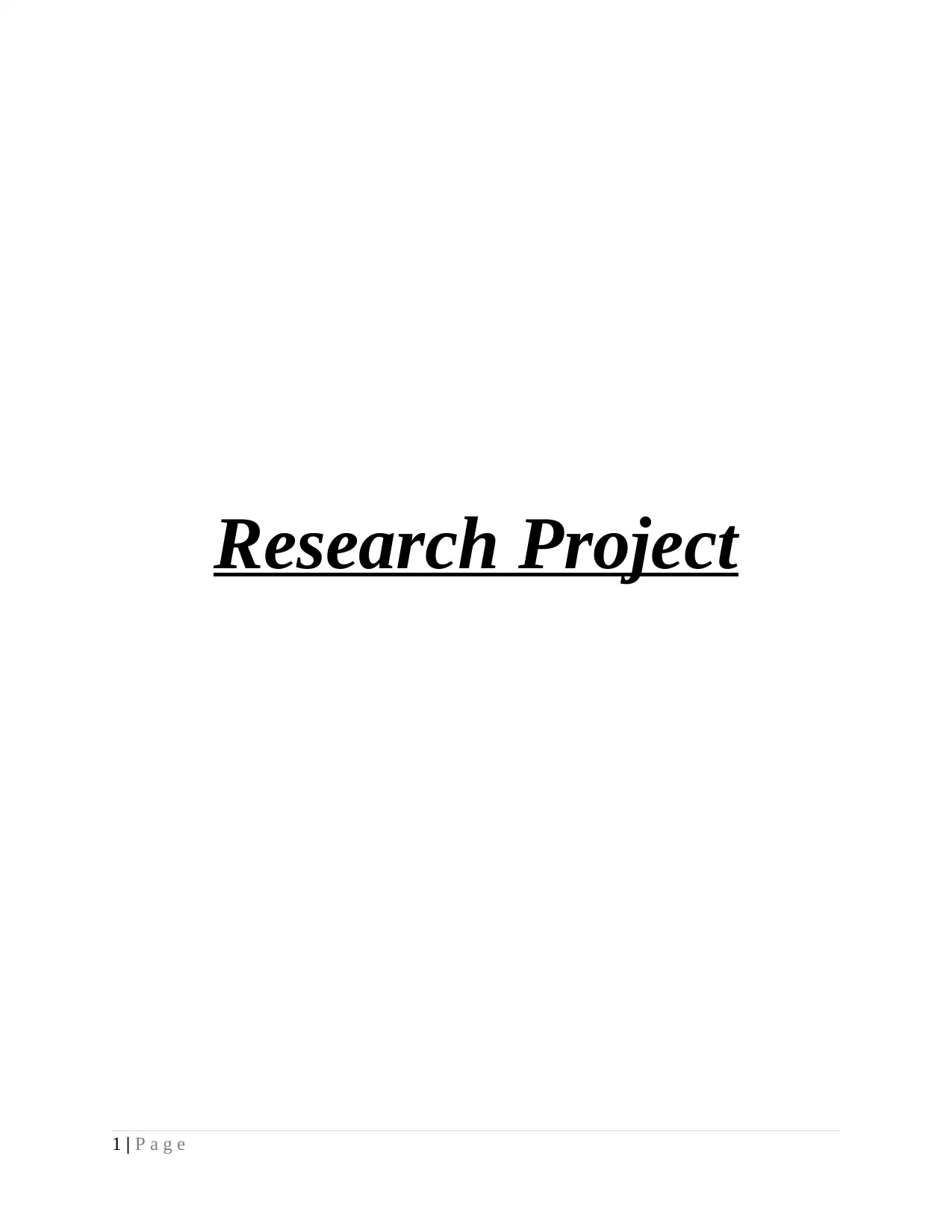
Research Project
1 | P a g e
1 | P a g e
Paraphrase This Document
Need a fresh take? Get an instant paraphrase of this document with our AI Paraphraser
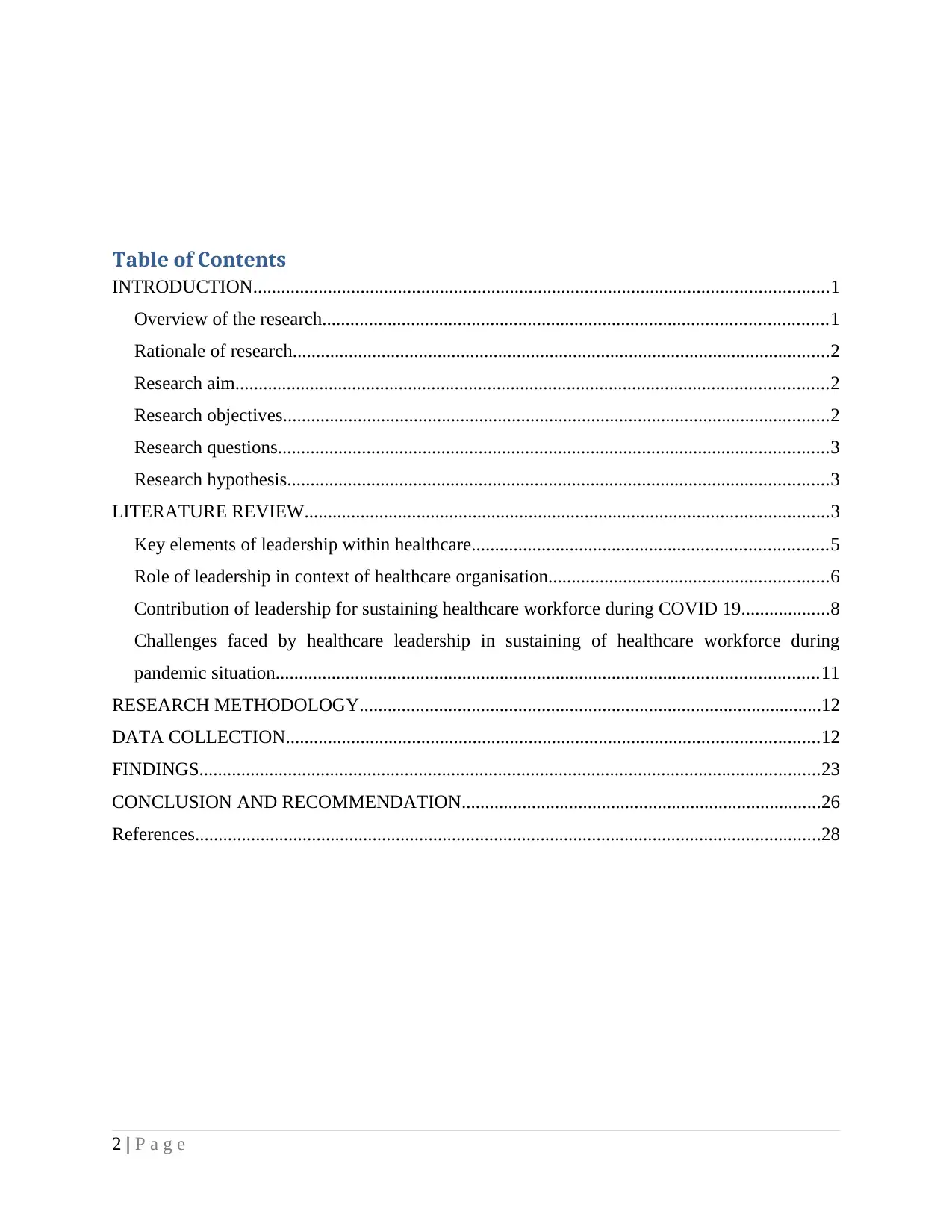
Table of Contents
INTRODUCTION...........................................................................................................................1
Overview of the research............................................................................................................1
Rationale of research...................................................................................................................2
Research aim...............................................................................................................................2
Research objectives.....................................................................................................................2
Research questions......................................................................................................................3
Research hypothesis....................................................................................................................3
LITERATURE REVIEW................................................................................................................3
Key elements of leadership within healthcare............................................................................5
Role of leadership in context of healthcare organisation............................................................6
Contribution of leadership for sustaining healthcare workforce during COVID 19...................8
Challenges faced by healthcare leadership in sustaining of healthcare workforce during
pandemic situation....................................................................................................................11
RESEARCH METHODOLOGY...................................................................................................12
DATA COLLECTION..................................................................................................................12
FINDINGS.....................................................................................................................................23
CONCLUSION AND RECOMMENDATION.............................................................................26
References......................................................................................................................................28
2 | P a g e
INTRODUCTION...........................................................................................................................1
Overview of the research............................................................................................................1
Rationale of research...................................................................................................................2
Research aim...............................................................................................................................2
Research objectives.....................................................................................................................2
Research questions......................................................................................................................3
Research hypothesis....................................................................................................................3
LITERATURE REVIEW................................................................................................................3
Key elements of leadership within healthcare............................................................................5
Role of leadership in context of healthcare organisation............................................................6
Contribution of leadership for sustaining healthcare workforce during COVID 19...................8
Challenges faced by healthcare leadership in sustaining of healthcare workforce during
pandemic situation....................................................................................................................11
RESEARCH METHODOLOGY...................................................................................................12
DATA COLLECTION..................................................................................................................12
FINDINGS.....................................................................................................................................23
CONCLUSION AND RECOMMENDATION.............................................................................26
References......................................................................................................................................28
2 | P a g e

3 | P a g e
⊘ This is a preview!⊘
Do you want full access?
Subscribe today to unlock all pages.

Trusted by 1+ million students worldwide
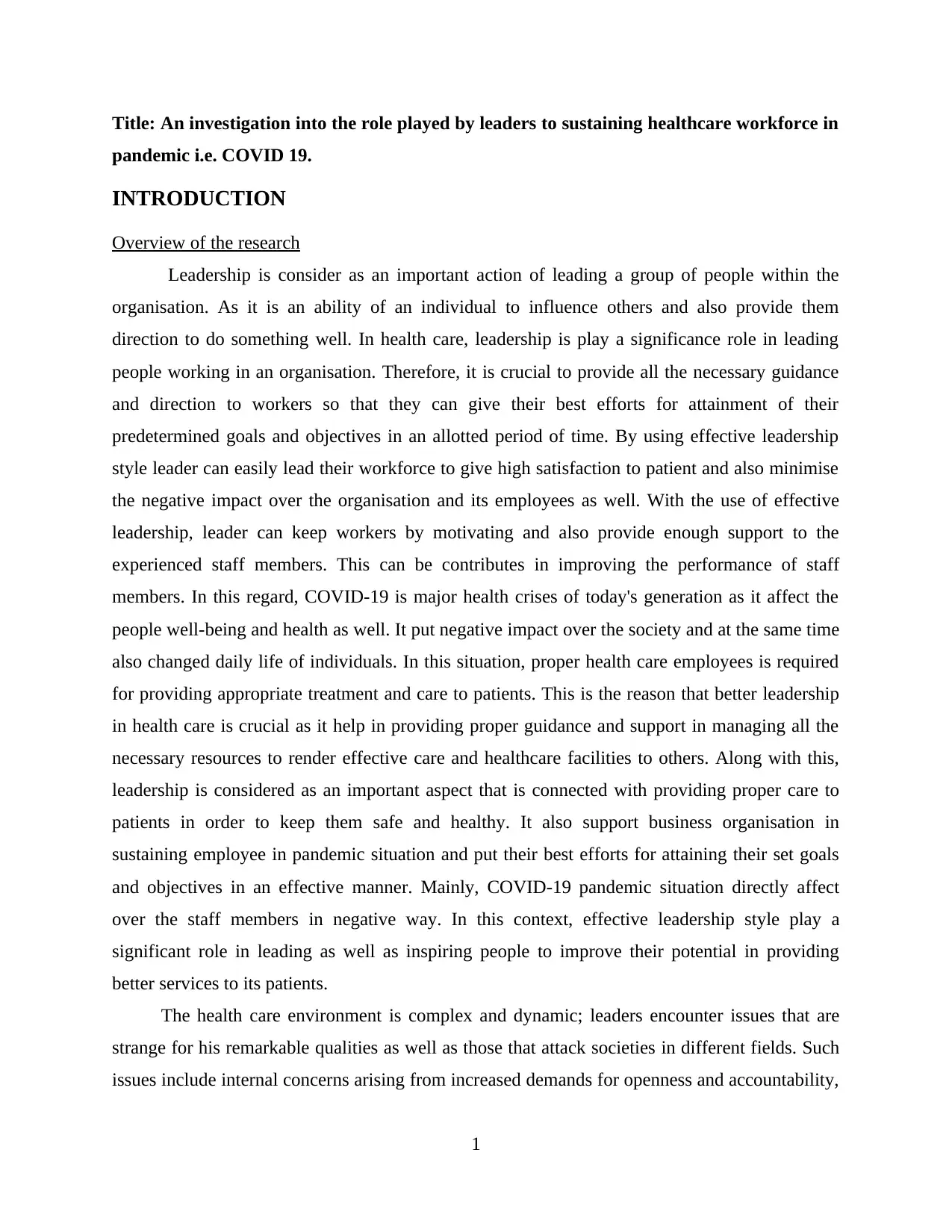
Title: An investigation into the role played by leaders to sustaining healthcare workforce in
pandemic i.e. COVID 19.
INTRODUCTION
Overview of the research
Leadership is consider as an important action of leading a group of people within the
organisation. As it is an ability of an individual to influence others and also provide them
direction to do something well. In health care, leadership is play a significance role in leading
people working in an organisation. Therefore, it is crucial to provide all the necessary guidance
and direction to workers so that they can give their best efforts for attainment of their
predetermined goals and objectives in an allotted period of time. By using effective leadership
style leader can easily lead their workforce to give high satisfaction to patient and also minimise
the negative impact over the organisation and its employees as well. With the use of effective
leadership, leader can keep workers by motivating and also provide enough support to the
experienced staff members. This can be contributes in improving the performance of staff
members. In this regard, COVID-19 is major health crises of today's generation as it affect the
people well-being and health as well. It put negative impact over the society and at the same time
also changed daily life of individuals. In this situation, proper health care employees is required
for providing appropriate treatment and care to patients. This is the reason that better leadership
in health care is crucial as it help in providing proper guidance and support in managing all the
necessary resources to render effective care and healthcare facilities to others. Along with this,
leadership is considered as an important aspect that is connected with providing proper care to
patients in order to keep them safe and healthy. It also support business organisation in
sustaining employee in pandemic situation and put their best efforts for attaining their set goals
and objectives in an effective manner. Mainly, COVID-19 pandemic situation directly affect
over the staff members in negative way. In this context, effective leadership style play a
significant role in leading as well as inspiring people to improve their potential in providing
better services to its patients.
The health care environment is complex and dynamic; leaders encounter issues that are
strange for his remarkable qualities as well as those that attack societies in different fields. Such
issues include internal concerns arising from increased demands for openness and accountability,
1
pandemic i.e. COVID 19.
INTRODUCTION
Overview of the research
Leadership is consider as an important action of leading a group of people within the
organisation. As it is an ability of an individual to influence others and also provide them
direction to do something well. In health care, leadership is play a significance role in leading
people working in an organisation. Therefore, it is crucial to provide all the necessary guidance
and direction to workers so that they can give their best efforts for attainment of their
predetermined goals and objectives in an allotted period of time. By using effective leadership
style leader can easily lead their workforce to give high satisfaction to patient and also minimise
the negative impact over the organisation and its employees as well. With the use of effective
leadership, leader can keep workers by motivating and also provide enough support to the
experienced staff members. This can be contributes in improving the performance of staff
members. In this regard, COVID-19 is major health crises of today's generation as it affect the
people well-being and health as well. It put negative impact over the society and at the same time
also changed daily life of individuals. In this situation, proper health care employees is required
for providing appropriate treatment and care to patients. This is the reason that better leadership
in health care is crucial as it help in providing proper guidance and support in managing all the
necessary resources to render effective care and healthcare facilities to others. Along with this,
leadership is considered as an important aspect that is connected with providing proper care to
patients in order to keep them safe and healthy. It also support business organisation in
sustaining employee in pandemic situation and put their best efforts for attaining their set goals
and objectives in an effective manner. Mainly, COVID-19 pandemic situation directly affect
over the staff members in negative way. In this context, effective leadership style play a
significant role in leading as well as inspiring people to improve their potential in providing
better services to its patients.
The health care environment is complex and dynamic; leaders encounter issues that are
strange for his remarkable qualities as well as those that attack societies in different fields. Such
issues include internal concerns arising from increased demands for openness and accountability,
1
Paraphrase This Document
Need a fresh take? Get an instant paraphrase of this document with our AI Paraphraser
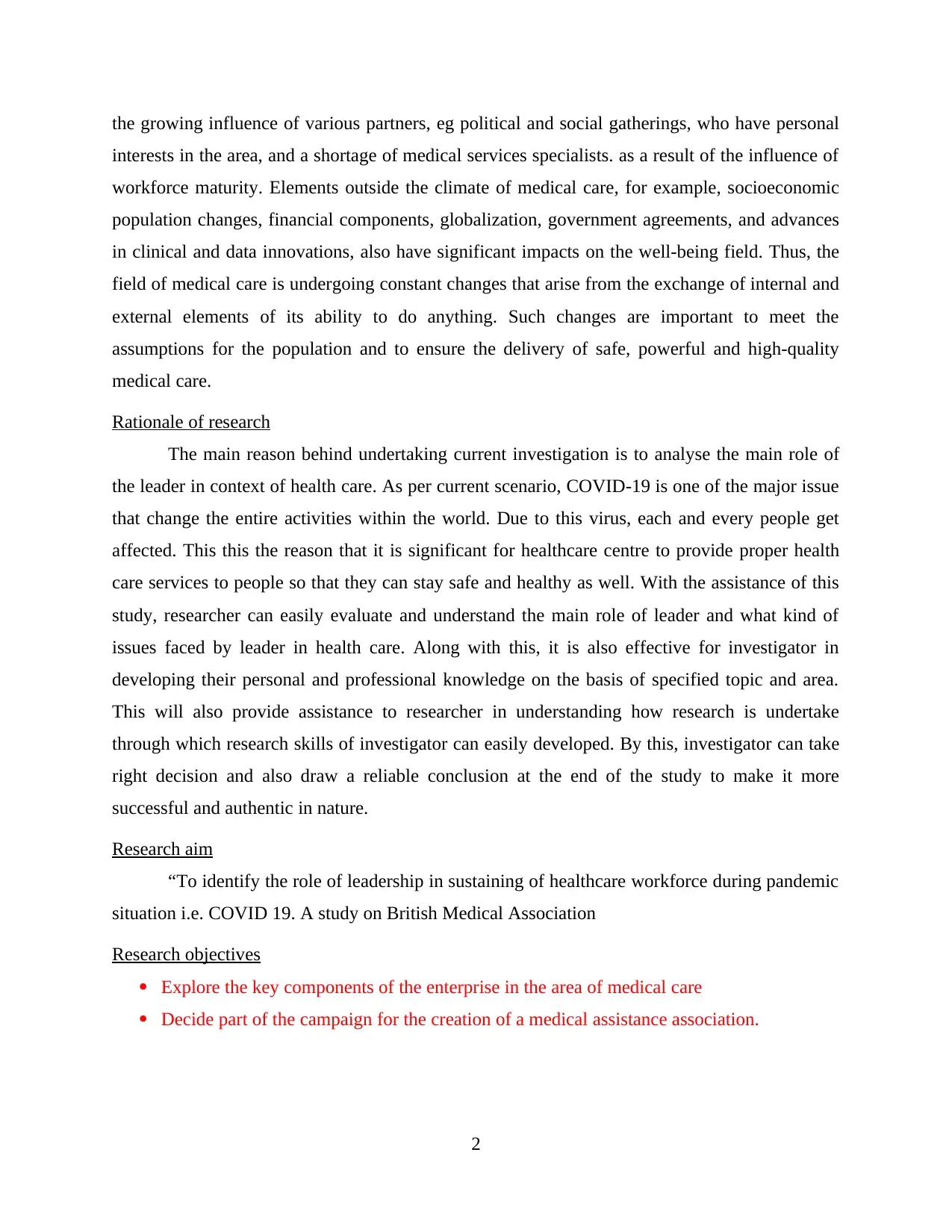
the growing influence of various partners, eg political and social gatherings, who have personal
interests in the area, and a shortage of medical services specialists. as a result of the influence of
workforce maturity. Elements outside the climate of medical care, for example, socioeconomic
population changes, financial components, globalization, government agreements, and advances
in clinical and data innovations, also have significant impacts on the well-being field. Thus, the
field of medical care is undergoing constant changes that arise from the exchange of internal and
external elements of its ability to do anything. Such changes are important to meet the
assumptions for the population and to ensure the delivery of safe, powerful and high-quality
medical care.
Rationale of research
The main reason behind undertaking current investigation is to analyse the main role of
the leader in context of health care. As per current scenario, COVID-19 is one of the major issue
that change the entire activities within the world. Due to this virus, each and every people get
affected. This this the reason that it is significant for healthcare centre to provide proper health
care services to people so that they can stay safe and healthy as well. With the assistance of this
study, researcher can easily evaluate and understand the main role of leader and what kind of
issues faced by leader in health care. Along with this, it is also effective for investigator in
developing their personal and professional knowledge on the basis of specified topic and area.
This will also provide assistance to researcher in understanding how research is undertake
through which research skills of investigator can easily developed. By this, investigator can take
right decision and also draw a reliable conclusion at the end of the study to make it more
successful and authentic in nature.
Research aim
“To identify the role of leadership in sustaining of healthcare workforce during pandemic
situation i.e. COVID 19. A study on British Medical Association
Research objectives
Explore the key components of the enterprise in the area of medical care
Decide part of the campaign for the creation of a medical assistance association.
2
interests in the area, and a shortage of medical services specialists. as a result of the influence of
workforce maturity. Elements outside the climate of medical care, for example, socioeconomic
population changes, financial components, globalization, government agreements, and advances
in clinical and data innovations, also have significant impacts on the well-being field. Thus, the
field of medical care is undergoing constant changes that arise from the exchange of internal and
external elements of its ability to do anything. Such changes are important to meet the
assumptions for the population and to ensure the delivery of safe, powerful and high-quality
medical care.
Rationale of research
The main reason behind undertaking current investigation is to analyse the main role of
the leader in context of health care. As per current scenario, COVID-19 is one of the major issue
that change the entire activities within the world. Due to this virus, each and every people get
affected. This this the reason that it is significant for healthcare centre to provide proper health
care services to people so that they can stay safe and healthy as well. With the assistance of this
study, researcher can easily evaluate and understand the main role of leader and what kind of
issues faced by leader in health care. Along with this, it is also effective for investigator in
developing their personal and professional knowledge on the basis of specified topic and area.
This will also provide assistance to researcher in understanding how research is undertake
through which research skills of investigator can easily developed. By this, investigator can take
right decision and also draw a reliable conclusion at the end of the study to make it more
successful and authentic in nature.
Research aim
“To identify the role of leadership in sustaining of healthcare workforce during pandemic
situation i.e. COVID 19. A study on British Medical Association
Research objectives
Explore the key components of the enterprise in the area of medical care
Decide part of the campaign for the creation of a medical assistance association.
2
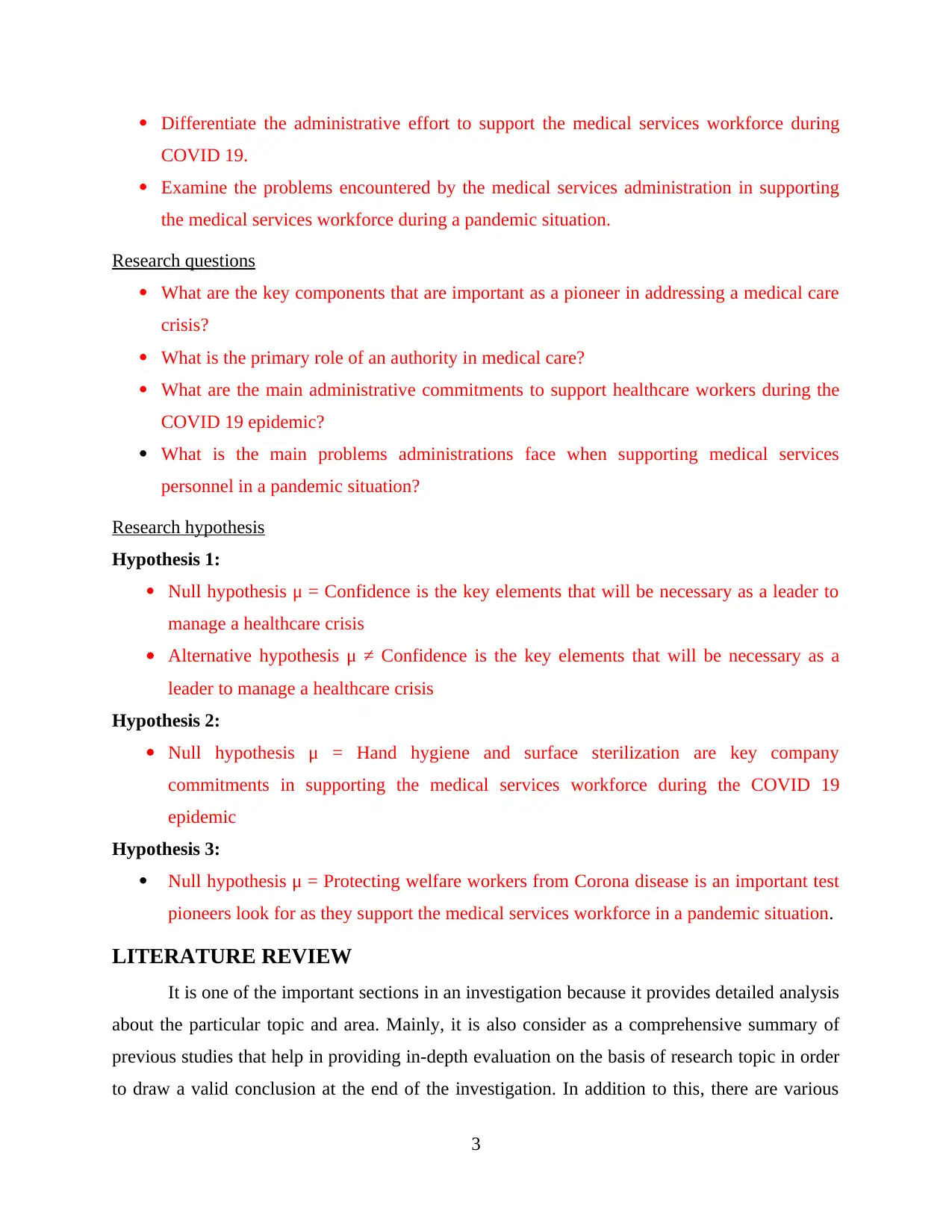
Differentiate the administrative effort to support the medical services workforce during
COVID 19.
Examine the problems encountered by the medical services administration in supporting
the medical services workforce during a pandemic situation.
Research questions
What are the key components that are important as a pioneer in addressing a medical care
crisis?
What is the primary role of an authority in medical care?
What are the main administrative commitments to support healthcare workers during the
COVID 19 epidemic?
What is the main problems administrations face when supporting medical services
personnel in a pandemic situation?
Research hypothesis
Hypothesis 1:
Null hypothesis μ = Confidence is the key elements that will be necessary as a leader to
manage a healthcare crisis
Alternative hypothesis μ ≠ Confidence is the key elements that will be necessary as a
leader to manage a healthcare crisis
Hypothesis 2:
Null hypothesis μ = Hand hygiene and surface sterilization are key company
commitments in supporting the medical services workforce during the COVID 19
epidemic
Hypothesis 3:
Null hypothesis μ = Protecting welfare workers from Corona disease is an important test
pioneers look for as they support the medical services workforce in a pandemic situation.
LITERATURE REVIEW
It is one of the important sections in an investigation because it provides detailed analysis
about the particular topic and area. Mainly, it is also consider as a comprehensive summary of
previous studies that help in providing in-depth evaluation on the basis of research topic in order
to draw a valid conclusion at the end of the investigation. In addition to this, there are various
3
COVID 19.
Examine the problems encountered by the medical services administration in supporting
the medical services workforce during a pandemic situation.
Research questions
What are the key components that are important as a pioneer in addressing a medical care
crisis?
What is the primary role of an authority in medical care?
What are the main administrative commitments to support healthcare workers during the
COVID 19 epidemic?
What is the main problems administrations face when supporting medical services
personnel in a pandemic situation?
Research hypothesis
Hypothesis 1:
Null hypothesis μ = Confidence is the key elements that will be necessary as a leader to
manage a healthcare crisis
Alternative hypothesis μ ≠ Confidence is the key elements that will be necessary as a
leader to manage a healthcare crisis
Hypothesis 2:
Null hypothesis μ = Hand hygiene and surface sterilization are key company
commitments in supporting the medical services workforce during the COVID 19
epidemic
Hypothesis 3:
Null hypothesis μ = Protecting welfare workers from Corona disease is an important test
pioneers look for as they support the medical services workforce in a pandemic situation.
LITERATURE REVIEW
It is one of the important sections in an investigation because it provides detailed analysis
about the particular topic and area. Mainly, it is also consider as a comprehensive summary of
previous studies that help in providing in-depth evaluation on the basis of research topic in order
to draw a valid conclusion at the end of the investigation. In addition to this, there are various
3
⊘ This is a preview!⊘
Do you want full access?
Subscribe today to unlock all pages.

Trusted by 1+ million students worldwide
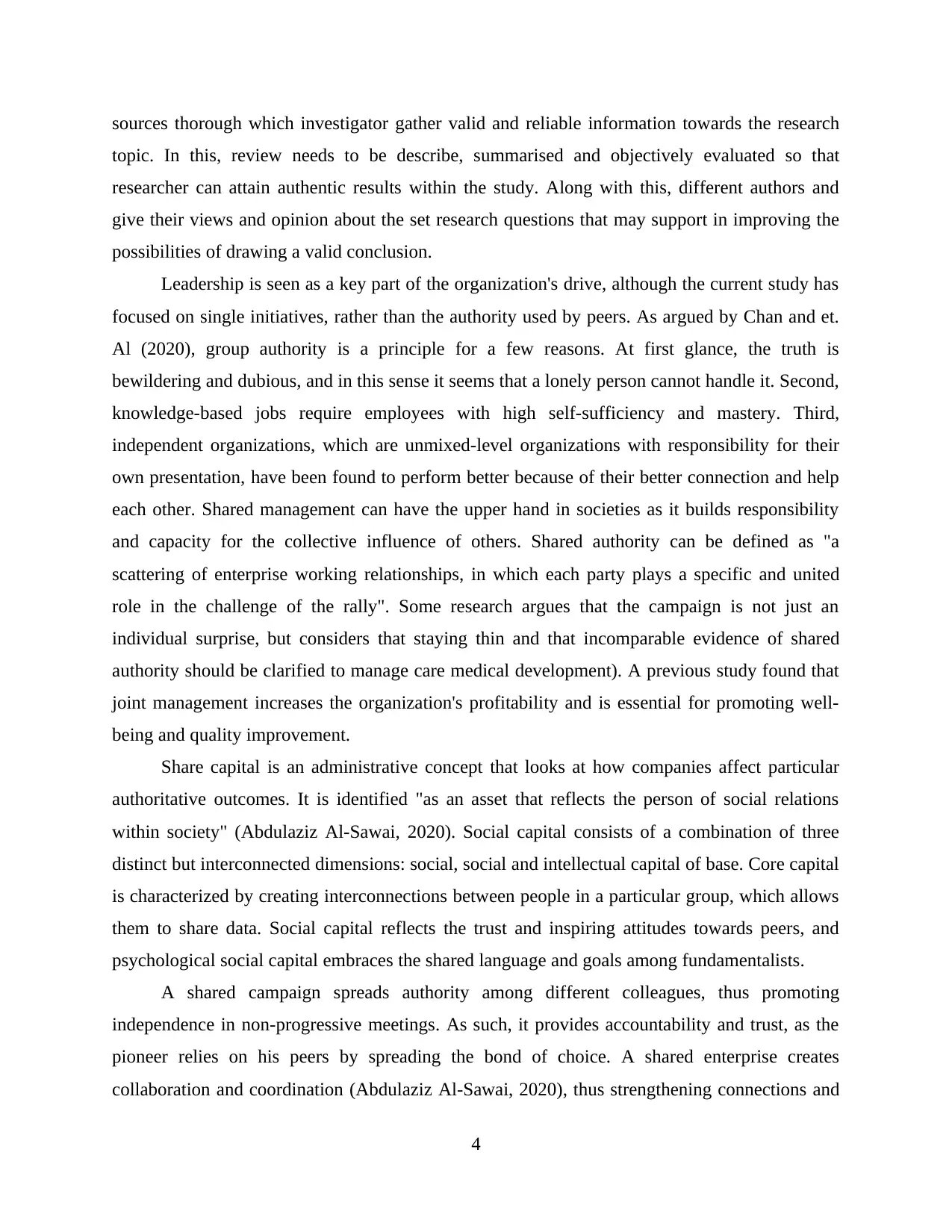
sources thorough which investigator gather valid and reliable information towards the research
topic. In this, review needs to be describe, summarised and objectively evaluated so that
researcher can attain authentic results within the study. Along with this, different authors and
give their views and opinion about the set research questions that may support in improving the
possibilities of drawing a valid conclusion.
Leadership is seen as a key part of the organization's drive, although the current study has
focused on single initiatives, rather than the authority used by peers. As argued by Chan and et.
Al (2020), group authority is a principle for a few reasons. At first glance, the truth is
bewildering and dubious, and in this sense it seems that a lonely person cannot handle it. Second,
knowledge-based jobs require employees with high self-sufficiency and mastery. Third,
independent organizations, which are unmixed-level organizations with responsibility for their
own presentation, have been found to perform better because of their better connection and help
each other. Shared management can have the upper hand in societies as it builds responsibility
and capacity for the collective influence of others. Shared authority can be defined as "a
scattering of enterprise working relationships, in which each party plays a specific and united
role in the challenge of the rally". Some research argues that the campaign is not just an
individual surprise, but considers that staying thin and that incomparable evidence of shared
authority should be clarified to manage care medical development). A previous study found that
joint management increases the organization's profitability and is essential for promoting well-
being and quality improvement.
Share capital is an administrative concept that looks at how companies affect particular
authoritative outcomes. It is identified "as an asset that reflects the person of social relations
within society" (Abdulaziz Al-Sawai, 2020). Social capital consists of a combination of three
distinct but interconnected dimensions: social, social and intellectual capital of base. Core capital
is characterized by creating interconnections between people in a particular group, which allows
them to share data. Social capital reflects the trust and inspiring attitudes towards peers, and
psychological social capital embraces the shared language and goals among fundamentalists.
A shared campaign spreads authority among different colleagues, thus promoting
independence in non-progressive meetings. As such, it provides accountability and trust, as the
pioneer relies on his peers by spreading the bond of choice. A shared enterprise creates
collaboration and coordination (Abdulaziz Al-Sawai, 2020), thus strengthening connections and
4
topic. In this, review needs to be describe, summarised and objectively evaluated so that
researcher can attain authentic results within the study. Along with this, different authors and
give their views and opinion about the set research questions that may support in improving the
possibilities of drawing a valid conclusion.
Leadership is seen as a key part of the organization's drive, although the current study has
focused on single initiatives, rather than the authority used by peers. As argued by Chan and et.
Al (2020), group authority is a principle for a few reasons. At first glance, the truth is
bewildering and dubious, and in this sense it seems that a lonely person cannot handle it. Second,
knowledge-based jobs require employees with high self-sufficiency and mastery. Third,
independent organizations, which are unmixed-level organizations with responsibility for their
own presentation, have been found to perform better because of their better connection and help
each other. Shared management can have the upper hand in societies as it builds responsibility
and capacity for the collective influence of others. Shared authority can be defined as "a
scattering of enterprise working relationships, in which each party plays a specific and united
role in the challenge of the rally". Some research argues that the campaign is not just an
individual surprise, but considers that staying thin and that incomparable evidence of shared
authority should be clarified to manage care medical development). A previous study found that
joint management increases the organization's profitability and is essential for promoting well-
being and quality improvement.
Share capital is an administrative concept that looks at how companies affect particular
authoritative outcomes. It is identified "as an asset that reflects the person of social relations
within society" (Abdulaziz Al-Sawai, 2020). Social capital consists of a combination of three
distinct but interconnected dimensions: social, social and intellectual capital of base. Core capital
is characterized by creating interconnections between people in a particular group, which allows
them to share data. Social capital reflects the trust and inspiring attitudes towards peers, and
psychological social capital embraces the shared language and goals among fundamentalists.
A shared campaign spreads authority among different colleagues, thus promoting
independence in non-progressive meetings. As such, it provides accountability and trust, as the
pioneer relies on his peers by spreading the bond of choice. A shared enterprise creates
collaboration and coordination (Abdulaziz Al-Sawai, 2020), thus strengthening connections and
4
Paraphrase This Document
Need a fresh take? Get an instant paraphrase of this document with our AI Paraphraser
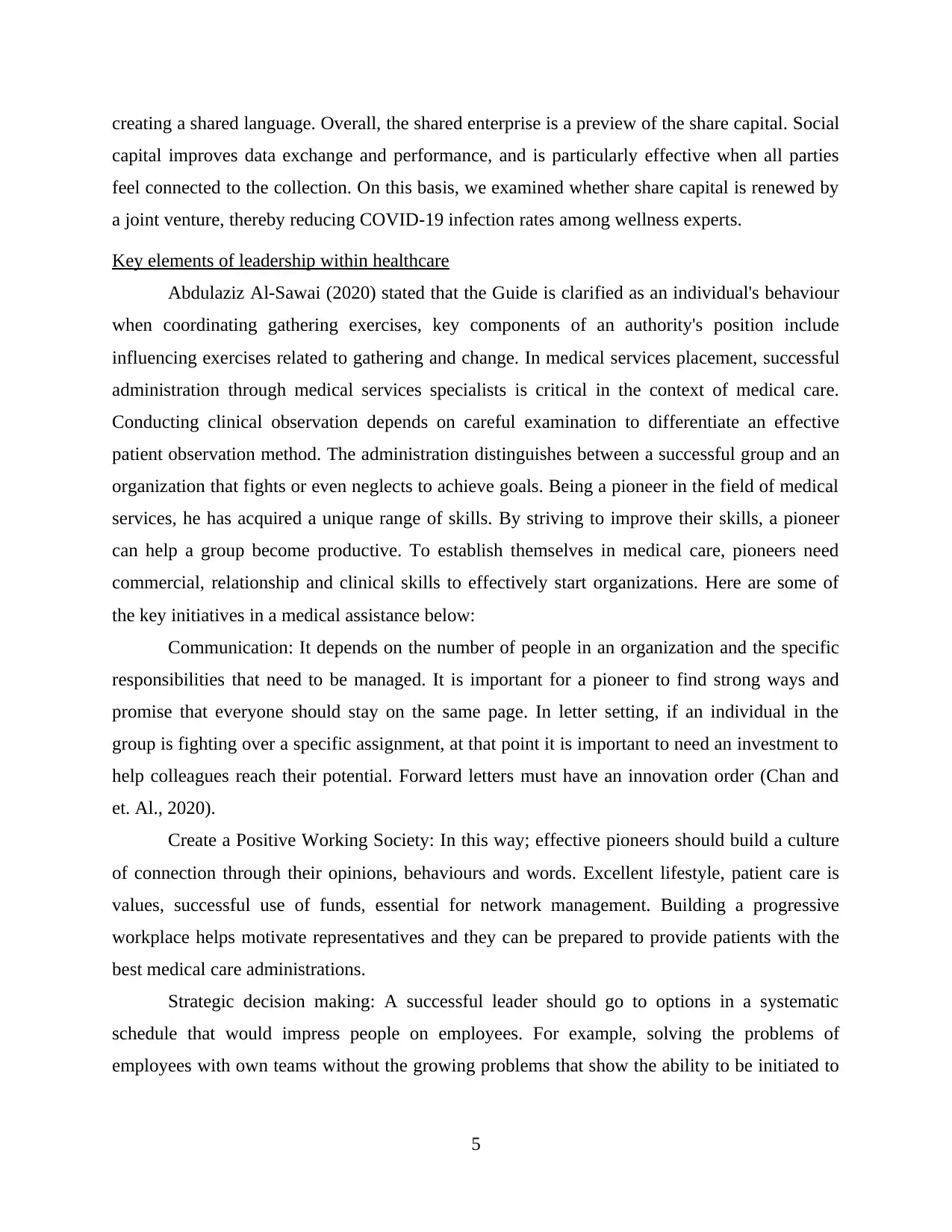
creating a shared language. Overall, the shared enterprise is a preview of the share capital. Social
capital improves data exchange and performance, and is particularly effective when all parties
feel connected to the collection. On this basis, we examined whether share capital is renewed by
a joint venture, thereby reducing COVID-19 infection rates among wellness experts.
Key elements of leadership within healthcare
Abdulaziz Al-Sawai (2020) stated that the Guide is clarified as an individual's behaviour
when coordinating gathering exercises, key components of an authority's position include
influencing exercises related to gathering and change. In medical services placement, successful
administration through medical services specialists is critical in the context of medical care.
Conducting clinical observation depends on careful examination to differentiate an effective
patient observation method. The administration distinguishes between a successful group and an
organization that fights or even neglects to achieve goals. Being a pioneer in the field of medical
services, he has acquired a unique range of skills. By striving to improve their skills, a pioneer
can help a group become productive. To establish themselves in medical care, pioneers need
commercial, relationship and clinical skills to effectively start organizations. Here are some of
the key initiatives in a medical assistance below:
Communication: It depends on the number of people in an organization and the specific
responsibilities that need to be managed. It is important for a pioneer to find strong ways and
promise that everyone should stay on the same page. In letter setting, if an individual in the
group is fighting over a specific assignment, at that point it is important to need an investment to
help colleagues reach their potential. Forward letters must have an innovation order (Chan and
et. Al., 2020).
Create a Positive Working Society: In this way; effective pioneers should build a culture
of connection through their opinions, behaviours and words. Excellent lifestyle, patient care is
values, successful use of funds, essential for network management. Building a progressive
workplace helps motivate representatives and they can be prepared to provide patients with the
best medical care administrations.
Strategic decision making: A successful leader should go to options in a systematic
schedule that would impress people on employees. For example, solving the problems of
employees with own teams without the growing problems that show the ability to be initiated to
5
capital improves data exchange and performance, and is particularly effective when all parties
feel connected to the collection. On this basis, we examined whether share capital is renewed by
a joint venture, thereby reducing COVID-19 infection rates among wellness experts.
Key elements of leadership within healthcare
Abdulaziz Al-Sawai (2020) stated that the Guide is clarified as an individual's behaviour
when coordinating gathering exercises, key components of an authority's position include
influencing exercises related to gathering and change. In medical services placement, successful
administration through medical services specialists is critical in the context of medical care.
Conducting clinical observation depends on careful examination to differentiate an effective
patient observation method. The administration distinguishes between a successful group and an
organization that fights or even neglects to achieve goals. Being a pioneer in the field of medical
services, he has acquired a unique range of skills. By striving to improve their skills, a pioneer
can help a group become productive. To establish themselves in medical care, pioneers need
commercial, relationship and clinical skills to effectively start organizations. Here are some of
the key initiatives in a medical assistance below:
Communication: It depends on the number of people in an organization and the specific
responsibilities that need to be managed. It is important for a pioneer to find strong ways and
promise that everyone should stay on the same page. In letter setting, if an individual in the
group is fighting over a specific assignment, at that point it is important to need an investment to
help colleagues reach their potential. Forward letters must have an innovation order (Chan and
et. Al., 2020).
Create a Positive Working Society: In this way; effective pioneers should build a culture
of connection through their opinions, behaviours and words. Excellent lifestyle, patient care is
values, successful use of funds, essential for network management. Building a progressive
workplace helps motivate representatives and they can be prepared to provide patients with the
best medical care administrations.
Strategic decision making: A successful leader should go to options in a systematic
schedule that would impress people on employees. For example, solving the problems of
employees with own teams without the growing problems that show the ability to be initiated to
5
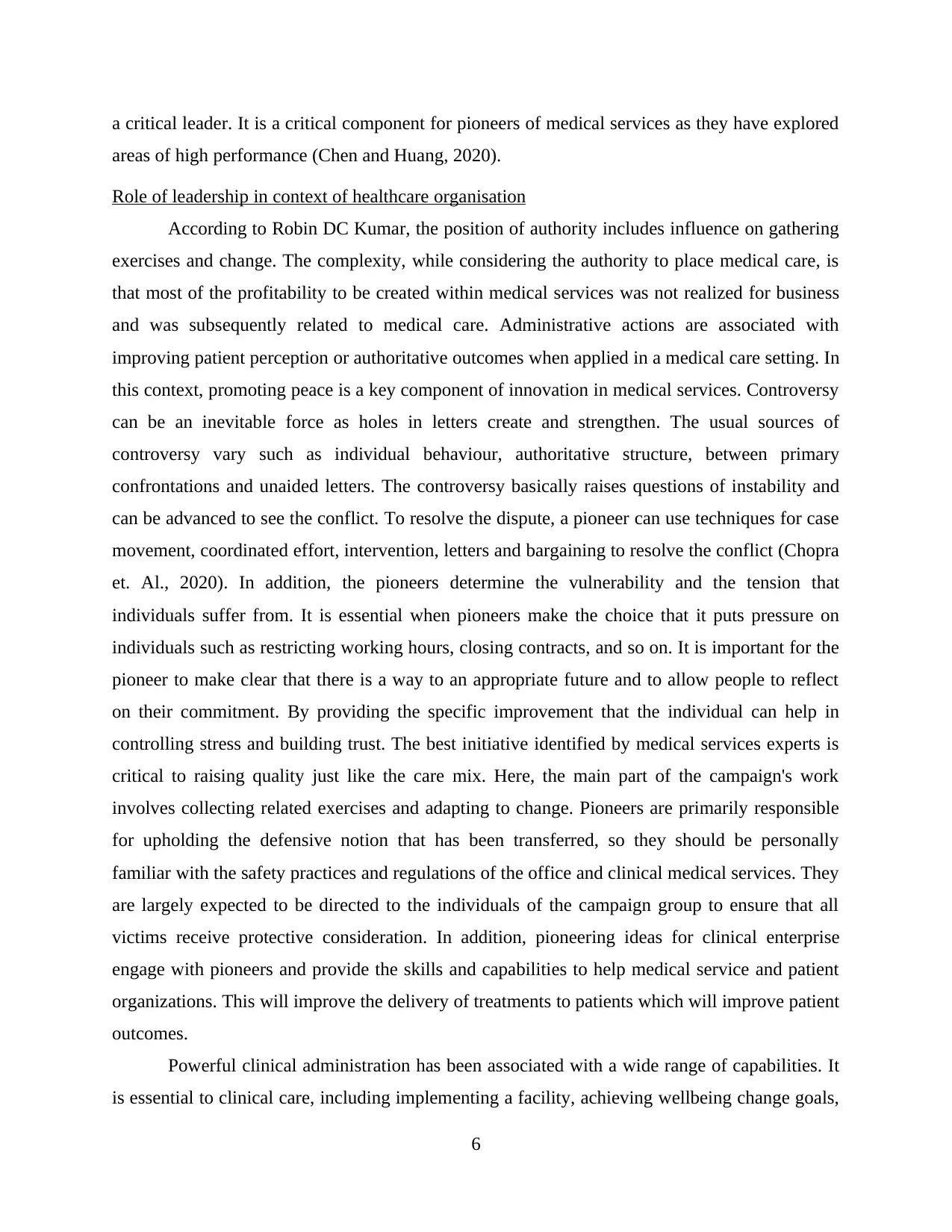
a critical leader. It is a critical component for pioneers of medical services as they have explored
areas of high performance (Chen and Huang, 2020).
Role of leadership in context of healthcare organisation
According to Robin DC Kumar, the position of authority includes influence on gathering
exercises and change. The complexity, while considering the authority to place medical care, is
that most of the profitability to be created within medical services was not realized for business
and was subsequently related to medical care. Administrative actions are associated with
improving patient perception or authoritative outcomes when applied in a medical care setting. In
this context, promoting peace is a key component of innovation in medical services. Controversy
can be an inevitable force as holes in letters create and strengthen. The usual sources of
controversy vary such as individual behaviour, authoritative structure, between primary
confrontations and unaided letters. The controversy basically raises questions of instability and
can be advanced to see the conflict. To resolve the dispute, a pioneer can use techniques for case
movement, coordinated effort, intervention, letters and bargaining to resolve the conflict (Chopra
et. Al., 2020). In addition, the pioneers determine the vulnerability and the tension that
individuals suffer from. It is essential when pioneers make the choice that it puts pressure on
individuals such as restricting working hours, closing contracts, and so on. It is important for the
pioneer to make clear that there is a way to an appropriate future and to allow people to reflect
on their commitment. By providing the specific improvement that the individual can help in
controlling stress and building trust. The best initiative identified by medical services experts is
critical to raising quality just like the care mix. Here, the main part of the campaign's work
involves collecting related exercises and adapting to change. Pioneers are primarily responsible
for upholding the defensive notion that has been transferred, so they should be personally
familiar with the safety practices and regulations of the office and clinical medical services. They
are largely expected to be directed to the individuals of the campaign group to ensure that all
victims receive protective consideration. In addition, pioneering ideas for clinical enterprise
engage with pioneers and provide the skills and capabilities to help medical service and patient
organizations. This will improve the delivery of treatments to patients which will improve patient
outcomes.
Powerful clinical administration has been associated with a wide range of capabilities. It
is essential to clinical care, including implementing a facility, achieving wellbeing change goals,
6
areas of high performance (Chen and Huang, 2020).
Role of leadership in context of healthcare organisation
According to Robin DC Kumar, the position of authority includes influence on gathering
exercises and change. The complexity, while considering the authority to place medical care, is
that most of the profitability to be created within medical services was not realized for business
and was subsequently related to medical care. Administrative actions are associated with
improving patient perception or authoritative outcomes when applied in a medical care setting. In
this context, promoting peace is a key component of innovation in medical services. Controversy
can be an inevitable force as holes in letters create and strengthen. The usual sources of
controversy vary such as individual behaviour, authoritative structure, between primary
confrontations and unaided letters. The controversy basically raises questions of instability and
can be advanced to see the conflict. To resolve the dispute, a pioneer can use techniques for case
movement, coordinated effort, intervention, letters and bargaining to resolve the conflict (Chopra
et. Al., 2020). In addition, the pioneers determine the vulnerability and the tension that
individuals suffer from. It is essential when pioneers make the choice that it puts pressure on
individuals such as restricting working hours, closing contracts, and so on. It is important for the
pioneer to make clear that there is a way to an appropriate future and to allow people to reflect
on their commitment. By providing the specific improvement that the individual can help in
controlling stress and building trust. The best initiative identified by medical services experts is
critical to raising quality just like the care mix. Here, the main part of the campaign's work
involves collecting related exercises and adapting to change. Pioneers are primarily responsible
for upholding the defensive notion that has been transferred, so they should be personally
familiar with the safety practices and regulations of the office and clinical medical services. They
are largely expected to be directed to the individuals of the campaign group to ensure that all
victims receive protective consideration. In addition, pioneering ideas for clinical enterprise
engage with pioneers and provide the skills and capabilities to help medical service and patient
organizations. This will improve the delivery of treatments to patients which will improve patient
outcomes.
Powerful clinical administration has been associated with a wide range of capabilities. It
is essential to clinical care, including implementing a facility, achieving wellbeing change goals,
6
⊘ This is a preview!⊘
Do you want full access?
Subscribe today to unlock all pages.

Trusted by 1+ million students worldwide
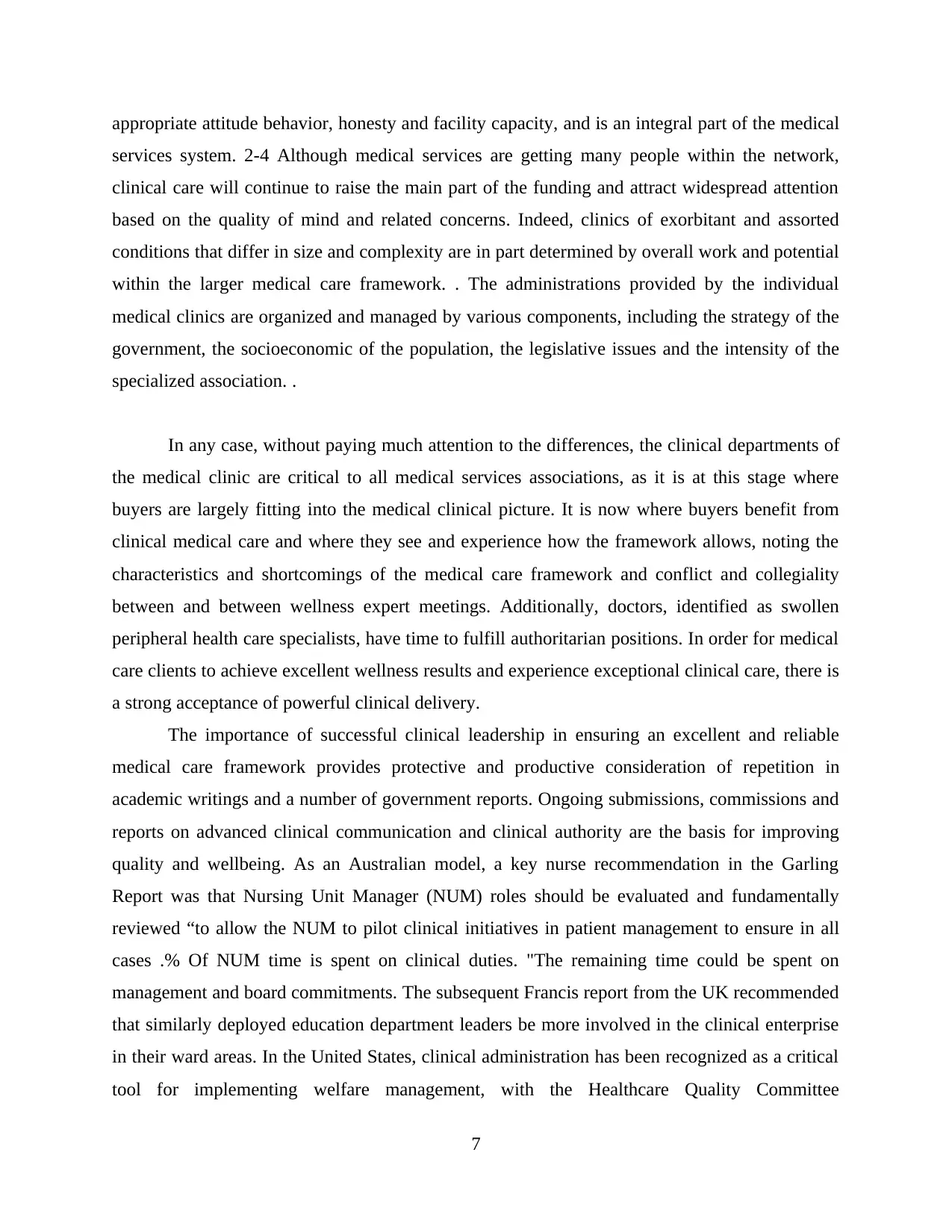
appropriate attitude behavior, honesty and facility capacity, and is an integral part of the medical
services system. 2-4 Although medical services are getting many people within the network,
clinical care will continue to raise the main part of the funding and attract widespread attention
based on the quality of mind and related concerns. Indeed, clinics of exorbitant and assorted
conditions that differ in size and complexity are in part determined by overall work and potential
within the larger medical care framework. . The administrations provided by the individual
medical clinics are organized and managed by various components, including the strategy of the
government, the socioeconomic of the population, the legislative issues and the intensity of the
specialized association. .
In any case, without paying much attention to the differences, the clinical departments of
the medical clinic are critical to all medical services associations, as it is at this stage where
buyers are largely fitting into the medical clinical picture. It is now where buyers benefit from
clinical medical care and where they see and experience how the framework allows, noting the
characteristics and shortcomings of the medical care framework and conflict and collegiality
between and between wellness expert meetings. Additionally, doctors, identified as swollen
peripheral health care specialists, have time to fulfill authoritarian positions. In order for medical
care clients to achieve excellent wellness results and experience exceptional clinical care, there is
a strong acceptance of powerful clinical delivery.
The importance of successful clinical leadership in ensuring an excellent and reliable
medical care framework provides protective and productive consideration of repetition in
academic writings and a number of government reports. Ongoing submissions, commissions and
reports on advanced clinical communication and clinical authority are the basis for improving
quality and wellbeing. As an Australian model, a key nurse recommendation in the Garling
Report was that Nursing Unit Manager (NUM) roles should be evaluated and fundamentally
reviewed “to allow the NUM to pilot clinical initiatives in patient management to ensure in all
cases .% Of NUM time is spent on clinical duties. "The remaining time could be spent on
management and board commitments. The subsequent Francis report from the UK recommended
that similarly deployed education department leaders be more involved in the clinical enterprise
in their ward areas. In the United States, clinical administration has been recognized as a critical
tool for implementing welfare management, with the Healthcare Quality Committee
7
services system. 2-4 Although medical services are getting many people within the network,
clinical care will continue to raise the main part of the funding and attract widespread attention
based on the quality of mind and related concerns. Indeed, clinics of exorbitant and assorted
conditions that differ in size and complexity are in part determined by overall work and potential
within the larger medical care framework. . The administrations provided by the individual
medical clinics are organized and managed by various components, including the strategy of the
government, the socioeconomic of the population, the legislative issues and the intensity of the
specialized association. .
In any case, without paying much attention to the differences, the clinical departments of
the medical clinic are critical to all medical services associations, as it is at this stage where
buyers are largely fitting into the medical clinical picture. It is now where buyers benefit from
clinical medical care and where they see and experience how the framework allows, noting the
characteristics and shortcomings of the medical care framework and conflict and collegiality
between and between wellness expert meetings. Additionally, doctors, identified as swollen
peripheral health care specialists, have time to fulfill authoritarian positions. In order for medical
care clients to achieve excellent wellness results and experience exceptional clinical care, there is
a strong acceptance of powerful clinical delivery.
The importance of successful clinical leadership in ensuring an excellent and reliable
medical care framework provides protective and productive consideration of repetition in
academic writings and a number of government reports. Ongoing submissions, commissions and
reports on advanced clinical communication and clinical authority are the basis for improving
quality and wellbeing. As an Australian model, a key nurse recommendation in the Garling
Report was that Nursing Unit Manager (NUM) roles should be evaluated and fundamentally
reviewed “to allow the NUM to pilot clinical initiatives in patient management to ensure in all
cases .% Of NUM time is spent on clinical duties. "The remaining time could be spent on
management and board commitments. The subsequent Francis report from the UK recommended
that similarly deployed education department leaders be more involved in the clinical enterprise
in their ward areas. In the United States, clinical administration has been recognized as a critical
tool for implementing welfare management, with the Healthcare Quality Committee
7
Paraphrase This Document
Need a fresh take? Get an instant paraphrase of this document with our AI Paraphraser
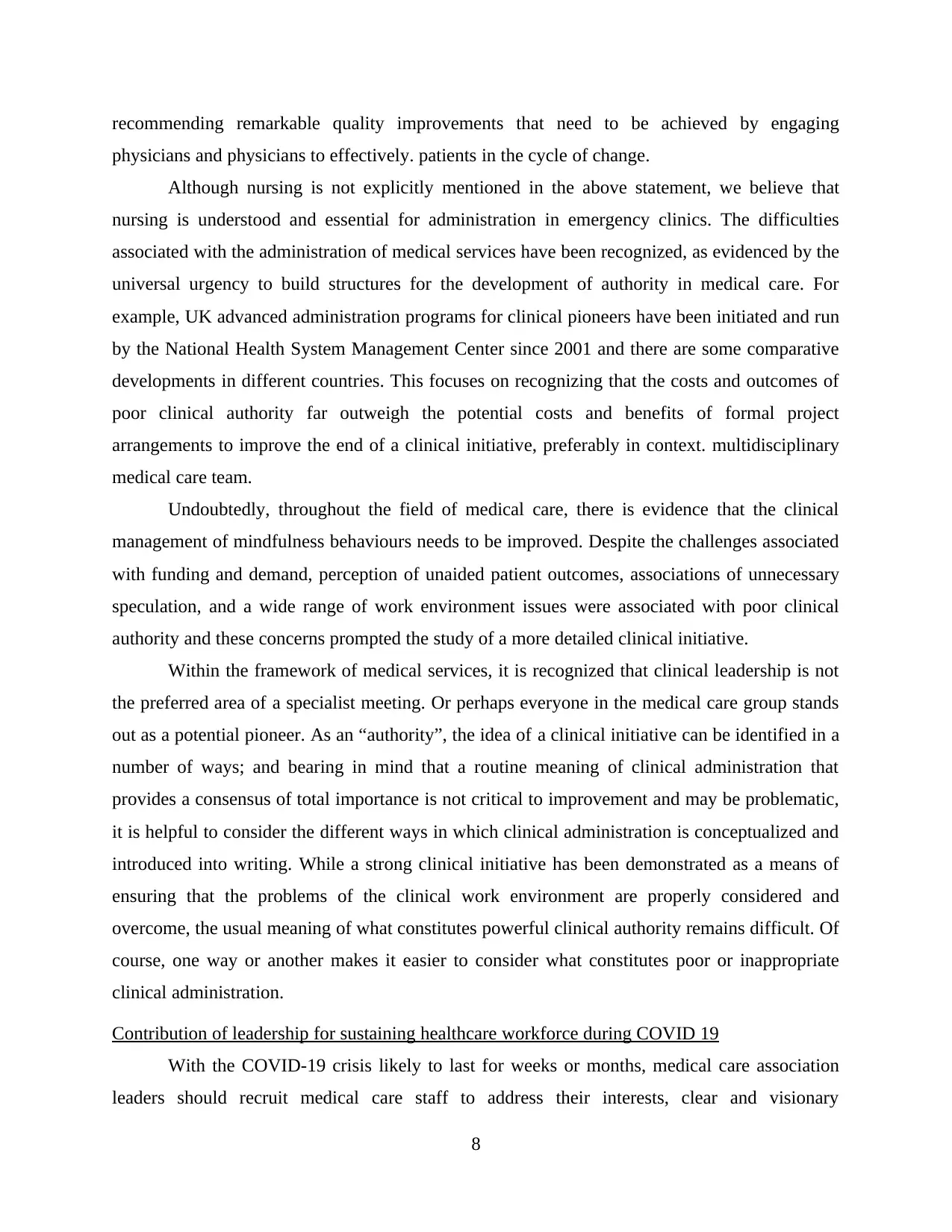
recommending remarkable quality improvements that need to be achieved by engaging
physicians and physicians to effectively. patients in the cycle of change.
Although nursing is not explicitly mentioned in the above statement, we believe that
nursing is understood and essential for administration in emergency clinics. The difficulties
associated with the administration of medical services have been recognized, as evidenced by the
universal urgency to build structures for the development of authority in medical care. For
example, UK advanced administration programs for clinical pioneers have been initiated and run
by the National Health System Management Center since 2001 and there are some comparative
developments in different countries. This focuses on recognizing that the costs and outcomes of
poor clinical authority far outweigh the potential costs and benefits of formal project
arrangements to improve the end of a clinical initiative, preferably in context. multidisciplinary
medical care team.
Undoubtedly, throughout the field of medical care, there is evidence that the clinical
management of mindfulness behaviours needs to be improved. Despite the challenges associated
with funding and demand, perception of unaided patient outcomes, associations of unnecessary
speculation, and a wide range of work environment issues were associated with poor clinical
authority and these concerns prompted the study of a more detailed clinical initiative.
Within the framework of medical services, it is recognized that clinical leadership is not
the preferred area of a specialist meeting. Or perhaps everyone in the medical care group stands
out as a potential pioneer. As an “authority”, the idea of a clinical initiative can be identified in a
number of ways; and bearing in mind that a routine meaning of clinical administration that
provides a consensus of total importance is not critical to improvement and may be problematic,
it is helpful to consider the different ways in which clinical administration is conceptualized and
introduced into writing. While a strong clinical initiative has been demonstrated as a means of
ensuring that the problems of the clinical work environment are properly considered and
overcome, the usual meaning of what constitutes powerful clinical authority remains difficult. Of
course, one way or another makes it easier to consider what constitutes poor or inappropriate
clinical administration.
Contribution of leadership for sustaining healthcare workforce during COVID 19
With the COVID-19 crisis likely to last for weeks or months, medical care association
leaders should recruit medical care staff to address their interests, clear and visionary
8
physicians and physicians to effectively. patients in the cycle of change.
Although nursing is not explicitly mentioned in the above statement, we believe that
nursing is understood and essential for administration in emergency clinics. The difficulties
associated with the administration of medical services have been recognized, as evidenced by the
universal urgency to build structures for the development of authority in medical care. For
example, UK advanced administration programs for clinical pioneers have been initiated and run
by the National Health System Management Center since 2001 and there are some comparative
developments in different countries. This focuses on recognizing that the costs and outcomes of
poor clinical authority far outweigh the potential costs and benefits of formal project
arrangements to improve the end of a clinical initiative, preferably in context. multidisciplinary
medical care team.
Undoubtedly, throughout the field of medical care, there is evidence that the clinical
management of mindfulness behaviours needs to be improved. Despite the challenges associated
with funding and demand, perception of unaided patient outcomes, associations of unnecessary
speculation, and a wide range of work environment issues were associated with poor clinical
authority and these concerns prompted the study of a more detailed clinical initiative.
Within the framework of medical services, it is recognized that clinical leadership is not
the preferred area of a specialist meeting. Or perhaps everyone in the medical care group stands
out as a potential pioneer. As an “authority”, the idea of a clinical initiative can be identified in a
number of ways; and bearing in mind that a routine meaning of clinical administration that
provides a consensus of total importance is not critical to improvement and may be problematic,
it is helpful to consider the different ways in which clinical administration is conceptualized and
introduced into writing. While a strong clinical initiative has been demonstrated as a means of
ensuring that the problems of the clinical work environment are properly considered and
overcome, the usual meaning of what constitutes powerful clinical authority remains difficult. Of
course, one way or another makes it easier to consider what constitutes poor or inappropriate
clinical administration.
Contribution of leadership for sustaining healthcare workforce during COVID 19
With the COVID-19 crisis likely to last for weeks or months, medical care association
leaders should recruit medical care staff to address their interests, clear and visionary
8
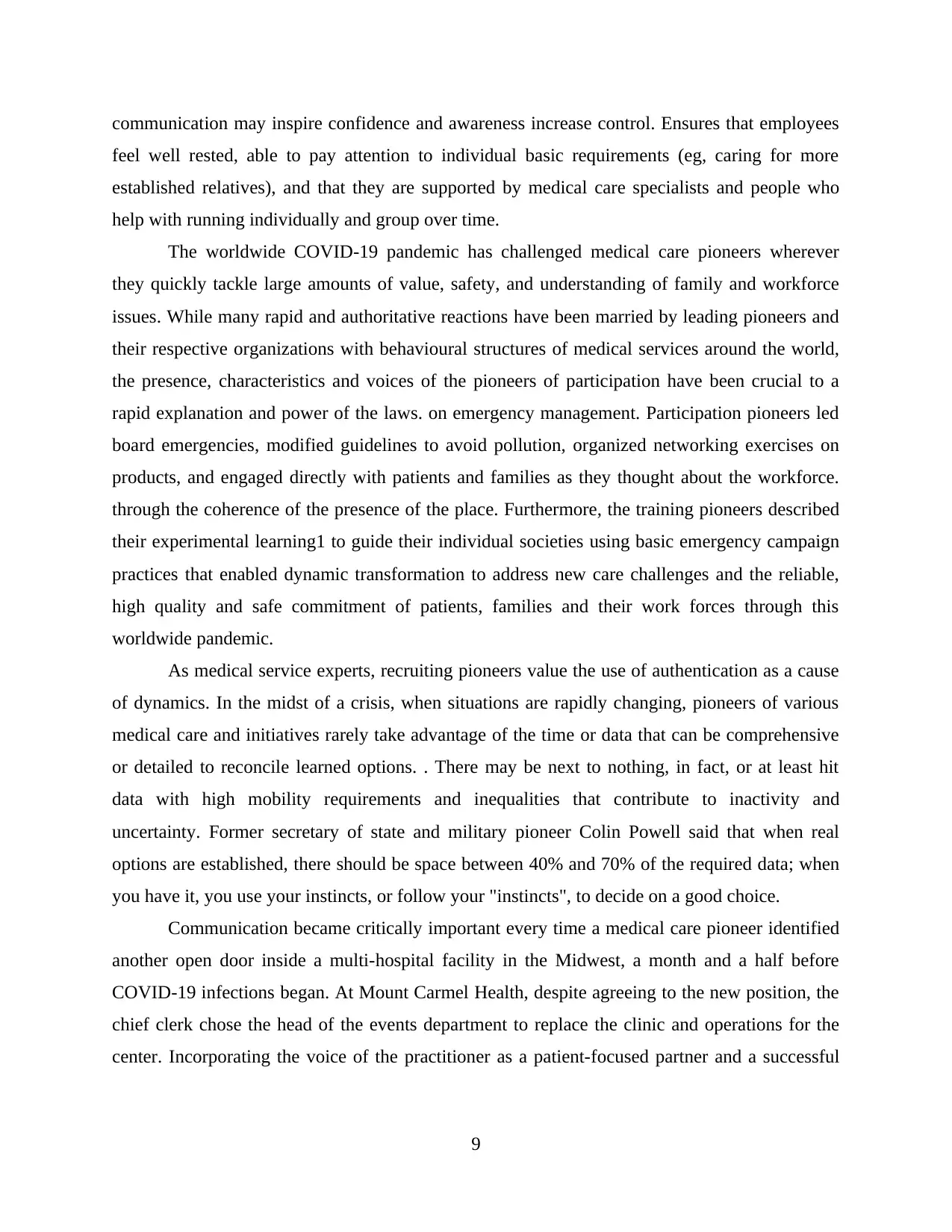
communication may inspire confidence and awareness increase control. Ensures that employees
feel well rested, able to pay attention to individual basic requirements (eg, caring for more
established relatives), and that they are supported by medical care specialists and people who
help with running individually and group over time.
The worldwide COVID-19 pandemic has challenged medical care pioneers wherever
they quickly tackle large amounts of value, safety, and understanding of family and workforce
issues. While many rapid and authoritative reactions have been married by leading pioneers and
their respective organizations with behavioural structures of medical services around the world,
the presence, characteristics and voices of the pioneers of participation have been crucial to a
rapid explanation and power of the laws. on emergency management. Participation pioneers led
board emergencies, modified guidelines to avoid pollution, organized networking exercises on
products, and engaged directly with patients and families as they thought about the workforce.
through the coherence of the presence of the place. Furthermore, the training pioneers described
their experimental learning1 to guide their individual societies using basic emergency campaign
practices that enabled dynamic transformation to address new care challenges and the reliable,
high quality and safe commitment of patients, families and their work forces through this
worldwide pandemic.
As medical service experts, recruiting pioneers value the use of authentication as a cause
of dynamics. In the midst of a crisis, when situations are rapidly changing, pioneers of various
medical care and initiatives rarely take advantage of the time or data that can be comprehensive
or detailed to reconcile learned options. . There may be next to nothing, in fact, or at least hit
data with high mobility requirements and inequalities that contribute to inactivity and
uncertainty. Former secretary of state and military pioneer Colin Powell said that when real
options are established, there should be space between 40% and 70% of the required data; when
you have it, you use your instincts, or follow your "instincts", to decide on a good choice.
Communication became critically important every time a medical care pioneer identified
another open door inside a multi-hospital facility in the Midwest, a month and a half before
COVID-19 infections began. At Mount Carmel Health, despite agreeing to the new position, the
chief clerk chose the head of the events department to replace the clinic and operations for the
center. Incorporating the voice of the practitioner as a patient-focused partner and a successful
9
feel well rested, able to pay attention to individual basic requirements (eg, caring for more
established relatives), and that they are supported by medical care specialists and people who
help with running individually and group over time.
The worldwide COVID-19 pandemic has challenged medical care pioneers wherever
they quickly tackle large amounts of value, safety, and understanding of family and workforce
issues. While many rapid and authoritative reactions have been married by leading pioneers and
their respective organizations with behavioural structures of medical services around the world,
the presence, characteristics and voices of the pioneers of participation have been crucial to a
rapid explanation and power of the laws. on emergency management. Participation pioneers led
board emergencies, modified guidelines to avoid pollution, organized networking exercises on
products, and engaged directly with patients and families as they thought about the workforce.
through the coherence of the presence of the place. Furthermore, the training pioneers described
their experimental learning1 to guide their individual societies using basic emergency campaign
practices that enabled dynamic transformation to address new care challenges and the reliable,
high quality and safe commitment of patients, families and their work forces through this
worldwide pandemic.
As medical service experts, recruiting pioneers value the use of authentication as a cause
of dynamics. In the midst of a crisis, when situations are rapidly changing, pioneers of various
medical care and initiatives rarely take advantage of the time or data that can be comprehensive
or detailed to reconcile learned options. . There may be next to nothing, in fact, or at least hit
data with high mobility requirements and inequalities that contribute to inactivity and
uncertainty. Former secretary of state and military pioneer Colin Powell said that when real
options are established, there should be space between 40% and 70% of the required data; when
you have it, you use your instincts, or follow your "instincts", to decide on a good choice.
Communication became critically important every time a medical care pioneer identified
another open door inside a multi-hospital facility in the Midwest, a month and a half before
COVID-19 infections began. At Mount Carmel Health, despite agreeing to the new position, the
chief clerk chose the head of the events department to replace the clinic and operations for the
center. Incorporating the voice of the practitioner as a patient-focused partner and a successful
9
⊘ This is a preview!⊘
Do you want full access?
Subscribe today to unlock all pages.

Trusted by 1+ million students worldwide
1 out of 33
Related Documents
Your All-in-One AI-Powered Toolkit for Academic Success.
+13062052269
info@desklib.com
Available 24*7 on WhatsApp / Email
![[object Object]](/_next/static/media/star-bottom.7253800d.svg)
Unlock your academic potential
Copyright © 2020–2025 A2Z Services. All Rights Reserved. Developed and managed by ZUCOL.



